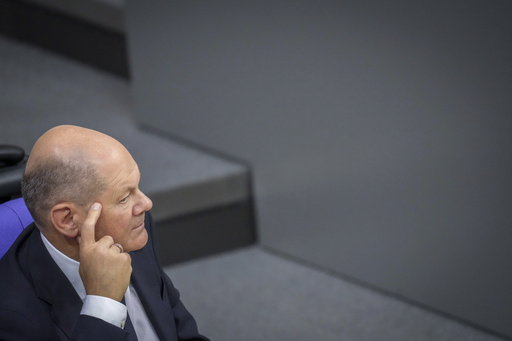
BERLIN – German Chancellor Olaf Scholz is scheduled to request a vote of confidence in December, which may lead to an early election in February. His three-party coalition government disintegrated last week.
Here are five essential insights regarding the political upheaval occurring in the largest economy of the European Union:
**Background of the Situation**
Scholz’s center-left Social Democrats partnered with Vice Chancellor Robert Habeck’s Green Party and the pro-business Free Democrats, headed by Christian Lindner, in 2021. This coalition aimed to bridge ideological gaps and pursue significant reforms to modernize Germany. While the government has some accomplishments to highlight, such as averting an energy crisis due to Russia’s gas supply cuts and initiating military modernization, public perception remains plagued by chronic dysfunction and in-fighting among coalition partners.
The coalition’s failure followed Scholz’s dismissal of Finance Minister Lindner over disagreements concerning economic revival strategies. This breakdown came after extended disputes about how to address the country’s economic decline in a nation once regarded as Europe’s economic locomotive.
**Economic Difficulties**
Germany has seen its economy decline over the last two years, impacted by the coronavirus pandemic, the ongoing conflict in Ukraine, and rising competition from China. The coalition struggled to reach consensus on pivotal economic matters. The Free Democrats opposed raising taxes or changing the country’s stringent self-imposed debt limits, while the Social Democrats and Greens pushed for substantial government investments, rejecting any cuts to welfare programs proposed by their partners.
The possible return of Donald Trump to the White House poses additional risks for the German economy, as he has threatened to impose tariffs up to 20% on EU imports, raising concerns about a potential trade war with European allies. Such tariffs would significantly harm German exports, complicating an economy that has relied on inexpensive energy from Russia and expansive export markets.
**Looking Ahead**
Scholz informed the parliament of his intent to request the confidence vote on December 11, with a parliamentary decision expected on December 16. In the interim, the Social Democrats and Greens will govern Germany as a minority government. Observers anticipate that Scholz will not win the confidence vote, paving the way for parliamentary elections set for February 23.
Following a loss in the confidence vote, German President Frank-Walter Steinmeier has 21 days to dissolve parliament—a formality that will precipitate new elections.
**Candidates for Chancellor**
Chancellor Scholz has expressed his desire to run for re-election. However, he has yet to receive an official endorsement from his party, and some Social Democrats are advocating against his candidacy due to his current lack of popularity. They have suggested Defense Minister Boris Pistorius, who is viewed favorably among the public, as an alternative. Both Scholz and Pistorius have not publicly addressed these suggestions.
Friedrich Merz, leader of the main opposition party—the center-right Christian Democrats—was officially appointed as their candidate in September and is leading in the polls to become the next chancellor. Merz has embraced campaign mode, remarking on the favorable reception of the dissolution of the current coalition government.
The Greens are likely to nominate Habeck as their chancellor candidate, as the party has seen a decline in support in recent elections. Additionally, the far-right Alternative for Germany (AfD) plans to nominate Alice Weidel as their candidate.
Current polling indicates that Merz’s Christian Democrats are around 30% or higher, while Scholz’s Social Democrats, once the leading governing party, hover at about 16%, trailing both the AfD at around 19% and their own coalition partners.
**Implications for the Far Right**
While it remains to be seen whether the populist AfD can achieve a commanding victory in the elections, current polls suggest a marked increase compared to their previous performance in the 2021 elections, where they secured only 10.4%. Recently, they made notable gains in state elections, even winning for the first time in post-World War II Germany in Thuringia, and finishing closely behind mainstream conservatives in Saxony.
Widespread dissatisfaction with the national government’s internal conflicts, alongside rising anti-immigration sentiments and skepticism towards military support for Ukraine, seems to be bolstering support for the AfD. The party has a stronghold in the eastern regions of the country, where its factions are under surveillance for being classified as “proven right-wing extremist” groups. The party’s leader in Thuringia, Björn Höcke, faces legal issues stemming from the use of Nazi rhetoric, a matter he is currently appealing.
Elsewhere in Western Europe, far-right parties have similarly experienced noteworthy victories in recent elections, highlighting a broader trend across the continent.
